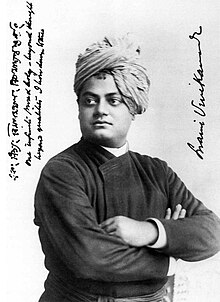
Back Swami Vivekananda Afrikaans Vivekananda ALS سوامي فيفي كاناندا Arabic سوامى بيبيكاناندا ARZ স্বামী বিবেকানন্দ Assamese Swami Vivekananda AST स्वामी विवेकानन्द AWA Vivekananda Azerbaijani Вивекананда Bashkir Свами Вивекананда Bulgarian
Vivekananda | |
|---|---|
স্বামী বিবেকানন্দ | |
 Vivekananda in Chicago, September 1893. In note on the left Vivekananda wrote: "One infinite pure and holy – beyond thought beyond qualities I bow down to thee".[1] | |
| Personal | |
| Born | Narendranath Datta 12 January 1863 |
| Died | 4 July 1902 (aged 39) |
| Religion | Hinduism |
| Citizenship | British subject |
| Era | Modern philosophy |
| Region | Eastern philosophy |
| School | |
| Lineage | Daśanāmi Sampradaya |
| Alma mater | University of Calcutta (BA) |
| Signature | |
| Organization | |
| Founder of | |
| Philosophy | Advaita Vedanta[2][3] Rāja Yoga[3] |
| Religious career | |
| Guru | Ramakrishna |
Influenced by | |
| Literary works | |
"Arise, awake, and stop not till the goal is reached"
(more on Wikiquote)
Swami Vivekananda (/ˈswɑːmi ˌvɪveɪˈkɑːnəndə/; Bengali: [ʃami bibekanɔndo] ; IAST: Svāmī Vivekānanda ; 12 January 1863 – 4 July 1902), born Narendranath Datta (Bengali: [nɔrendronatʰ dɔto]), was an Indian Hindu monk, philosopher, author, religious teacher, and the chief disciple of the Indian mystic Ramakrishna.[4][5] He was a key figure in the introduction of Vedanta and Yoga to the Western world,[6][7][8] and the father of modern Indian nationalism who is credited with raising interfaith awareness and bringing Hinduism to the status of a major world religion.[9]
Born into an aristocratic Bengali Kayastha family in Calcutta, Vivekananda was inclined from a young age towards religion and spirituality. He later found his guru Ramakrishna and became a monk. After the death of Ramakrishna, Vivekananda extensively toured the Indian subcontinent acquiring first-hand knowledge of the living conditions of Indian people in then British India. Moved by their plight, he resolved to help his countrymen and found a way to travel to the United States, where he became a popular figure after the 1893 Parliament of Religions in Chicago at which he delivered his famous speech beginning with the words: "Sisters and brothers of America ..." while introducing Hinduism to Americans.[10][11] He was so impactful at the Parliament that an American newspaper described him as "an orator by divine right and undoubtedly the greatest figure at the Parliament".[12]
After great success at the Parliament, in the subsequent years, Vivekananda delivered hundreds of lectures across the United States, England and Europe, disseminating the core tenets of Hindu philosophy, and founded the Vedanta Society of New York and the Vedanta Society of San Francisco (now Vedanta Society of Northern California),[13] both of which became the foundations for Vedanta Societies in the West. In India, Vivekananda founded the Ramakrishna Math, which provides spiritual training for monastics and householder devotees, and the Ramakrishna Mission, which provides charity, social work and education.[7]
Vivekananda was one of the most influential philosophers and social reformers in his contemporary India, and the most successful missionaries of Vedanta to the Western world. He was also a major force in contemporary Hindu reform movements and contributed to the concept of nationalism in colonial India.[14] He is now widely regarded as one of the most influential people of modern India and a patriotic saint. His birthday in India is celebrated as National Youth Day.[15][16]
- ^ "World fair 1893 circulated photo". vivekananda.net. Retrieved 11 April 2012.
- ^ "Bhajanānanda (2010), Four Basic Principles of Advaita Vedanta, p.3" (PDF). Retrieved 28 December 2019.
- ^ a b De Michelis 2005.
- ^ "Swami Vivekananda: A short biography". www.oneindia.com. Retrieved 3 May 2017.
- ^ "Life History & Teachings of Swami Vivekanand". Retrieved 3 May 2017.
- ^ "International Yoga Day: How Swami Vivekananda helped popularise the ancient Indian regimen in the West". 21 June 2017.
- ^ a b Feuerstein 2002, p. 600.
- ^ Syman, Stefanie (2010). The Subtle Body: The Story of Yoga in America. New York: Farrar, Straus, and Giroux. p. 59. ISBN 978-0-374-23676-2.
- ^ Clarke 2006, p. 209.
- ^ Barrows, John Henry (1893). The World's Parliament of Religions. The Parliament of Religions Publishing Company. p. 101.
- ^ Dutt 2005, p. 121.
- ^ "Sisters and brothers of America — full text of Swami Vivekananda's iconic Chicago speech". The Print. 4 July 2019.
- ^ Jackson 1994, p. 115.
- ^ Von Dense 1999, p. 191.
- ^ "Know About Swami Vivekananda on National Youth Day 2022". SA News Channel. 11 January 2022. Retrieved 12 January 2022.
- ^ "National Youth Day 2022: Images, Wishes, and Quotes by Swami Vivekananda That Continue to Inspire us Even Today!". News18. 12 January 2022. Retrieved 12 January 2022.
© MMXXIII Rich X Search. We shall prevail. All rights reserved. Rich X Search